 |
|
 |
2010
April
28-30
|
We drive on a parkway and park on a driveway
We really do drive on a parkway and park on a driveway, every day.
Except today. We've just had the driveway repaved. The following pictures,
although not very well matched, will give you some idea what's going on.
The Irish say, "May the road rise to meet you," and ours was doing it —
elevated about 4 inches and cracked by an enormous tree root.
It also zigzagged to avoid some trees that were cut down 15 years ago.
The new driveway is straighter in both dimensions.
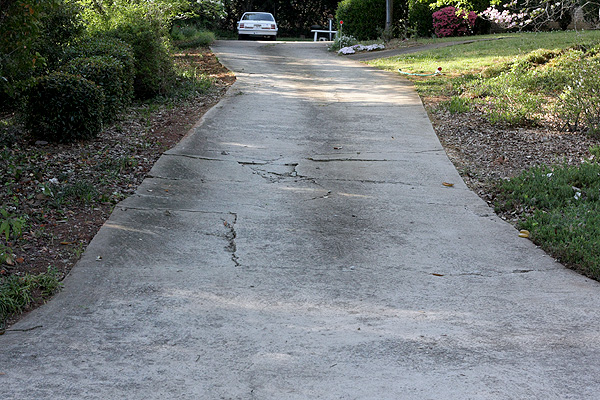

I'm going to close out April now; it's been a very busy month.
But I've been doing some interesting
church work.
See you in May!
Permanent link to this entry


|
2010
April
27
|
Unusual 911 calls
Facebook has several collections of amusing 911 calls and the like.
Some things I wouldn't have known:
- People call 911 during meteor showers.
- People call 911 during eclipses. ("There's something wrong with the moon!")
- When closed-captioned TV was new, there was a flurry of 911 calls about it.
- Some people don't know that a car door can be unlocked by putting the key in it, or by
pulling up the button on the inside.
Permanent link to this entry


|
2010
April
26
|
A chorus of reasonable voices
In the years since I started following the
"Christian Money Management"
cultural movement, I am gratified to have seen more reasonable voices
join the discussion. As an alternative to of one-size-fits-all, burn-your-credit-cards approaches,
we now have a variety of open-minded, well-informed writers with no particular gimmicks,
just a desire to find and follow good advice.
Two that I particularly recommend are
Paul Williams' Provident Planning
and
Craig Ford's Money Help for Christians.
Have a look.
Permanent link to this entry


|
2010
April
25
|
Yes, web sites know where you are...
And that can make for some interesting scams
Right now, if you go to
http://www.internetjobnews.net/
it will tell you that someone in your town, or one nearby, is making a lot of money from
their scheme.
That, of course, is false, and consumer advocates are jumping on them.
No matter where you are, they claim that Kelly Richards,
their imaginary satisfied customer, is in your town. It's a load of malarkey.
How do they do this? Well, remember that the Internet is a network.
You are located at a particular place on it, called your IP address, and for most
IP addresses, it's easy to find the geographical location.
You can see yours here.
As you travel, you'll see that it shows where you actually are,
not where your ISP is headquartered.
If your ISP serves a wide area, the location is probably not exact, and it can vary.
BellSouth sometimes routes my data through Atlanta and sometimes through a site
in the Carolinas.
Is this a violation of your privacy? Of course not.
You choose to join the network. Every computer that sends data to you
has to know how to get it there. The Internet is a network with
no headquarters. If you imagined that the data packets to go "headquarters" before
they go to you, you're wrong. There is no "telephone company" that forwards them
all to their destinations. Computers find routes and connect to each other.
Permanent link to this entry
An interesting financial statistic
I heard a flurry of discussion on the radio the other day revolving around the fact
that FICO credit scores do not show ability to pay, nor overall financial health — just
whether you've made a lot of payments on time.
So what should be used instead? Net worth? Cash flow? (Basic accounting measurements that
the credit industry ignores.) Or how about the percentage of your past year's income that
was spent on interest (of all types, whether deductible or not)? That might be an
interesting thing to measure.
Permanent link to this entry


|
2010
April
24
|
A GHP 1973 Picture Album
The Georgia Governor's Honors Program
In 1973, I attended the Governor's Honors Program, which was then held
at Wesleyan College, Macon, with side trips for the physics majors (only)
to laboratories at Macon Junior College. I was a physics major.
Below are some pictures I took.
This was GHP's golden age, or at least its silver age (since we postdated
"M.O.B." and were led by "Colonel" Hogan). As I said yesterday, I think GHP's
usefulness has decreased, and now we have the sad news that there will apparently
be no GHP 2011. Anyhow, here's what it looked like in 1973.
The main courtyard of Wesleyan College:
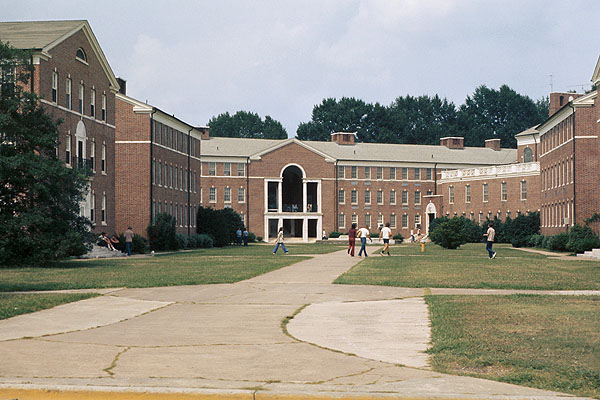
Students lounging in the loggia (an unusual architectural feature, a kind of breezeway):
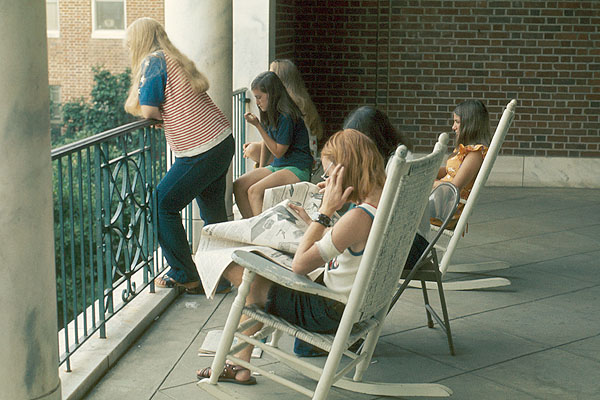
The fountain, near the end of GHP (hence the romantic couples):

Incidentally, on the next to last day of GHP, some students told me they were
going to throw me into the fountain on the last day, and that I should prepare
to go peacefully. A couple of hours later, the fountain was drained for cleaning.
I am sworn to secrecy as to whether these two events were connected.
Your humble author, in a computer lab at Macon Junior College:
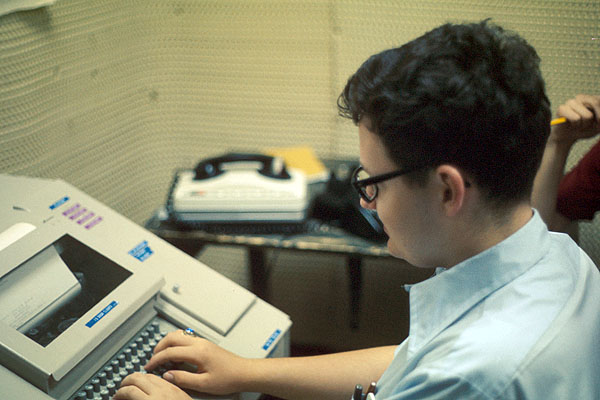
We connected to the University of Georgia CDC 6400 over a noisy 110-baud line.
The terminal was a Model 33 Teletype in a noise-reducing enclosure.
The telephone handset was physically inserted into the modem, which
coupled to it acoustically, because at the time, electrical connections
of non-Bell-System equipment to the telephone line were forbidden.
The science teachers, Lonnie Love and Tom Bass:
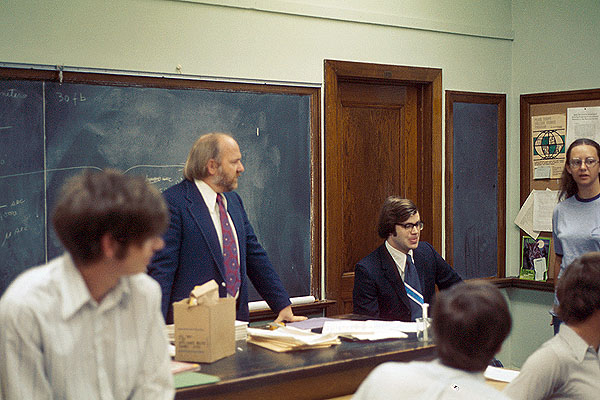
(In a building at Wesleyan, on the last or next-to-last day of GHP.)
A meal being served "family-style" in the Wesleyan dining hall:
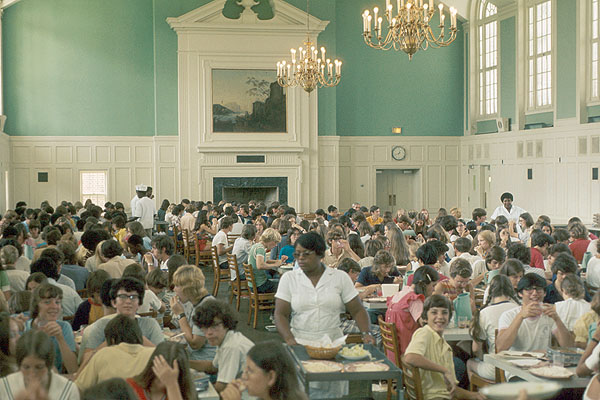
Finally, the recreation room:
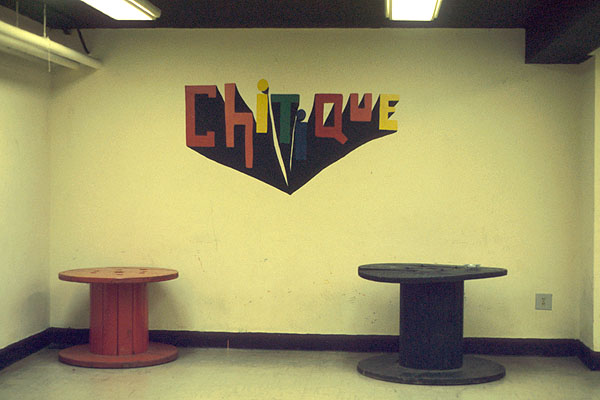
To this day I don't know what "Chitique" means and fear it may have been
some kind of joke in bad taste. Besides colorful
wire spools and a mysterious word on the wall, this room also had chairs and tables.
It was the only room where smoking was permitted (yes, high-schoolers were allowed
to smoke, with limitations, in 1973). It was also the only air-conditioned place
you could hang out other than the library, so non-smokers also frequented it.
"When this music ends, the 1973 Georgia Governor's Honors Program will be over."
Those were the traditional closing words at the final assembly and concert;
I heard them again (mutatis mutandis) when Cathy finished GHP 2002.
Who else, among my readers, remembers?
Permanent link to this entry


|
2010
April
23
|
R.I.P. GHP?
There are reports that the
Georgia Governor's Honors Program (GHP) is being eliminated
from the 2011 state budget. GHP is a free summer camp for high-achieving
high-school juniors and seniors. When I attended it (1973), it had exactly
400 students, chosen for geographic diversity so that rural Georgia was
disproportionately well represented.
My major was physics, but I actually spent my time
learning Fortran, Spanish literature, and Italian, almost entirely on my own.
At that time the governor of Georgia came and met all the students.
When Jimmy Carter was there, though, I was in Washington receiving
an
award that was to be presented by President Nixon. (I was a U.S. President's
Australian Science Scholar.) Nixon, however, was in the hospital and
the award was presented by the head of the National Science Foundation.
Accordingly, I missed meeting two Presidents of the United States on
the same day.
GHP will be sorely missed. Its effect was largely to put high-achieving
Georgians in contact with each other and persuade them to remain in the
state, or come back after going to college elsewhere. At least two of my
Facebook friends right now are GHP '73 alumni; another half dozen went to
GHP in other years.
Having said all this, I wonder if GHP is as much needed today as it was
when it started in 1964. Back then, the usual college-bound Georgian had
non-college-educated parents and had simply never experienced academia.
GHP was a delightful, and for many people unprecedented, experience of
contact with other highly intelligent people.
Based on what I've heard, in the 1980s GHP changed somewhat. Parents
were more educated; few of the students had actually
had no other contact with higher
education; and "résumé-building" became more common, so that
more people were wanting to go to GHP as a status symbol rather than
because they really wanted the experience. Student discipline became
more of a challenge (I've heard stories...). Maybe today GHP is not quite
what we need.
Permanent link to this entry


|
2010
April
22
|
Skimcast — software that does library research for you
Today my former graduate student, Dr. Bill Hollingsworth, showed
us his magnum opus, a software tool called
Skimcast, which is like
a search engine with brains.
|
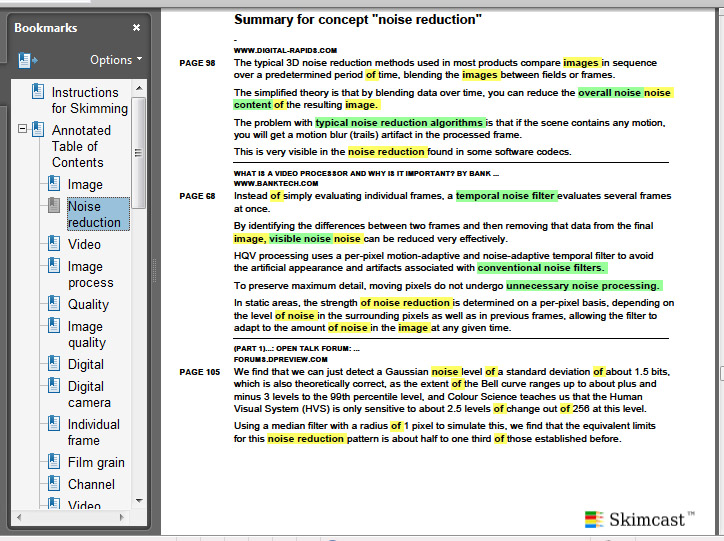
|
| |
Go to www.skimcast.com and try it.
You can sign up for a membership and submit queries, which are completed within
a few minutes or hours; or you can read a
summary of the day's news (a page whose format is presently somewhat
browser-dependent, since you're working with a prototype).
Skimcast doesn't just look things up on Google or similar search engines.
It digests the information and picks out the passages you need to read,
delivering its final report in browsable PDF.
It's like having a helpful graduate student who really knows how to use
the library.
A word of caution: If you're good at using Google, you may be mis-prepared
for Skimcast. In Google, you have to anticipate someone else's exact
words and be as narrow as possible. In Skimcast, you should express your concept,
whether it's narrow or not, and let Skimcast compare how various people have put
it into words.
Permanent link to this entry


|
2010
April
21
|
Store credit cards: An old idea is new again
As credit cards continue to lose their glamor,
Target
Stores are reviving an old tactic —
they are leaving the Visa system and issuing credit cards
that can only be used in their own stores.
That, you recall, is how credit cards got started in the first place.
You had to buy Shell or Texaco gasoline or get your clothes at Sears or Macy's
because those were the only places for which you had credit cards.
Then Bankamericard (Visa) and Master Charge (later MasterCard) gave you
the ability to charge your purchases everywhere, and the economy
of the 1990s ensued.
I'm not enamored of store cards. I'll either use cards that are accepted
everywhere or pay in cash.
Permanent link to this entry


|
2010
April
20
|
Making something out of matter
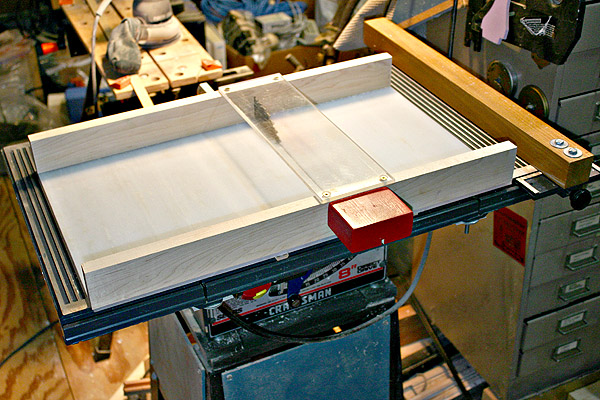
Occasionally I feel the urge to make something out of real physical matter
rather than words or software.
On Sunday afternoon I built something to help me build more things out of
matter — a sliding crosscut table for my table saw.
This is how I get a tiny, low-end table saw (a classic Sears 8-inch)
to do precise work, even on relatively large pieces of wood.
I built a slightly smaller version of the same gadget many years ago,
and it always bugged me that I couldn't crosscut a 12-inch-wide board.
Now I can.
The red block is a safety feature which I once wrote up for Fine Woodworking
magazine, and apparently that very short article influenced other people too, because now
I see other people including this component. It covers the blade where it emerges
from the near side of the sliding saw table.
Note also, at the extreme right, the fence, which I built out of a prefabricated
ash wood table leg to replace the rather flexible metal fence that came with the
saw.
By the way, standards have risen; modern table saws, even low-end ones, are
more solidly built than this one. But this one has an induction motor and
is almost silent when not actually cutting wood. It is also very low-powered.
Photo hint:
Since everything was lit from above, I got better shadow fill by
holding the camera upside down when firing its built-in flash
to fill in shadows. That way, the flash was lower than the eye
and helped to fill shadows that were directly below objects.
Even so, it's not a great picture.
Permanent link to this entry


|
2010
April
19
|
A paradigm shift regarding the economic downturn
I'm not sure how many people have thought through the significance
of the fraud charges against Goldman Sachs, and how this will change
people's understanding of the economic downturn.
We were wondering why investors were so eager to buy such risky mortgages.
In the case of those buying from
Goldman Sachs, it now appears that they were being tricked.
I don't know the credibility of the charges, nor, if true, how much they
really explain the economic downturn. But now there is a scapegoat.
Permanent link to this entry


|
2010
April
18
|
Astronomical classified ads
For many years Astromart has been the leading
online classified ad venue for amateur astronomers to resell their equipment.
And I didn't use it because, although it was free to noncommercial users, they classified
me as a commercial user and wanted me to buy advertising for my books.
(I don't sell my books, and I never wanted to advertise them on Astromart.)
Without an account, you not only can't place ads, you can't respond to ads
to buy things.
Now they charge $12 (apparently a one-time fee)
for a (noncommercial) membership, and they've allowed me to join
at that rate under the condition that I never identify myself as a book author.
So I'm back on Astromart... and it seems to have dwindled a bit.
Not only that, but
Cloudy Nights Classifieds has grown to at least half the
volume of Astromart, if not more.
AstroClassifieds occupies a distant but
respectable third place.
Among its sponsors is a dealer that I hold in very high esteem, Oceanside (OPT).
There are other astronomy classified ad sites, but they don't seem to have
achieved critical mass. This is the kind of thing where everybody would like for
everything to be on a single central site, or at most two; having to look at five or ten of them
isn't good. Unless, of course, you want a bargain!
We use eBay too, of course, but there's a big difference.
On eBay you see a lot of junk — such as, right now, a multitude of cheap
binoculars classified as reflecting telescopes by someone misusing the system.
But there is also a huge number of legitimate items, many of them bargain-priced.
It may be a bad year for astronomy because of the Icelandic volcano dust cloud.
I hope the dust falls into the Mediterranean and doesn't contiue to circulate in
the upper atmosphere for months, as it could easily do.
Permanent link to this entry


|
2010
April
17
|
Declining University funding
Although the recession is currently cited as the reason for University of Georgia
funding cuts,
the Athens Banner-Herald reports
that, corrected for inflation,
state per-student spending has declined 25% since 2001. (I don't know whether
that is just for our institution or for the whole system.) That means that during
the boom years (2005-2007), we were actually downgrading.
Meanwhile, the president has a larger and more elegant office than ever before,
and we have a huge new Student Center that is only half utilized.
Permanent link to this entry


|
2010
April
14-16
|
Crunch time
The University has awakened from its winter slumbers and now seems to be
trying to do a whole year in one month. I cannot take on any more
obligations for April no matter what they are.
Permanent link to this entry


|
2010
April
13
|
I had to "unfriend" someone...
I have long had a strict policy of not answering e-mail from people who
won't give their real names. It saves a lot of trouble.
For related reasons, I've just had to "unfriend" someone on Facebook.
If you will only give a fictitious name, I won't maintain a link to you,
because I have no idea who you really are or what you might do.
Permanent link to this entry


|
2010
April
12
|
Weather on other planets


These pictures were taken under mediocre conditions, but they both show
weather on other planets. On Mars, there is a white cloud at the left edge
of the visible face of the planet. On Saturn, there is a white spot (a storm)
at top center.
Storms on Saturn are uncommon, and they provide a valuable opportunity to measure
the rotation of the planet's atmosphere, which does not normally contain any spots
whose rotation can be tracked. This picture is from a 5-minute video sequence that
began at 10:13 p.m. on April 10, 2010.
Permanent link to this entry
Extreme fixed-tripod astrophotography
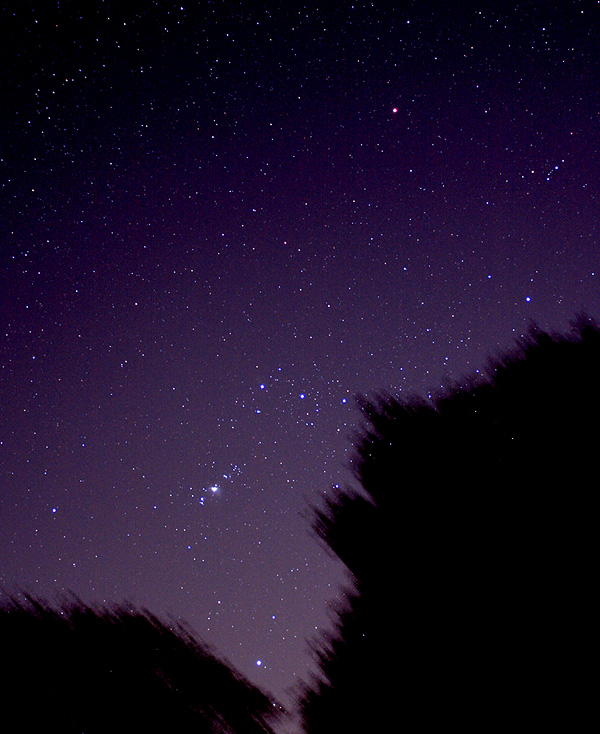
We routinely rotate and stack multiple images to make up for inaccuracies in the way the
telescope tracks the stars. How about using a totally inaccurate tracker, i.e.,
one that doesn't move at all? That's what I did. This is a stack of fifteen
separate 5-second exposures taken with a Canon EOS 40D and 28/2.8 lens (wide open)
on a fixed tripod. On the original, M78 and part of the Zeta Orionis nebula are visible.
Permanent link to this entry
North America redone
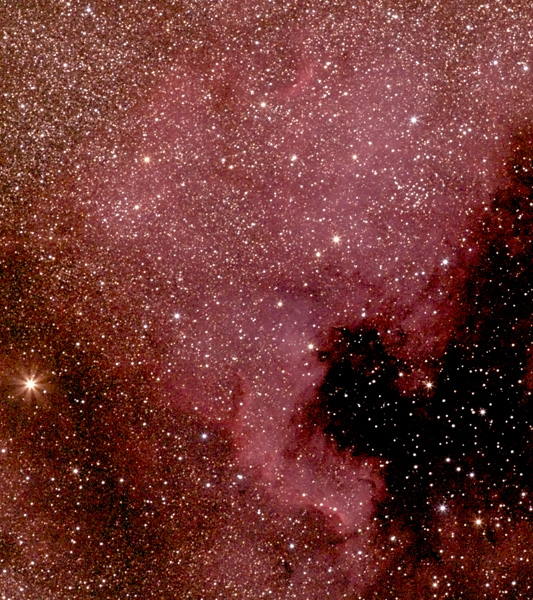
I'm trying out Deep Sky Stacker, a good
free program for converting and stacking image files.
I used it to re-do my
October 20 image of the North America Nebula.
Definitely a success!
Permanent link to this entry


|
2010
April
11
|
Almost an invention
During lunch today, I thought of a rather novel electronic circuit
(which I won't discuss here just yet), and decided that if it turned
out to be original, I'd try to get it patented. So I bought a lab
notebook and spent half an hour writing down everything I'd thought of
and planning experiments (none of which have been done yet).
Then I used Google, and in five minutes had found a patent for essentially
the same circuit.
Three thoughts...
(1) It wasn't patented until 1996 even though the parts needed to build it
had existed since before 1980. So it's a pretty good invention — not
something that was obvious.
(2) I found the patent in five minutes, so I'm a tolerably good
patent consultant. (Note: I am not a patent searcher. But I do
consulting work in which I help people develop patents and understand
pre-existing patents, on the technical side, not the legal side.
Usually, searchers find too much material, and then
we have to figure out how much of it is really relevant.)
(3) There may still be some aspects of my version that are new —
which is why I'm not publishing it here just yet.
Permanent link to this entry


|
2010
April
10
|
VIX is back to normal
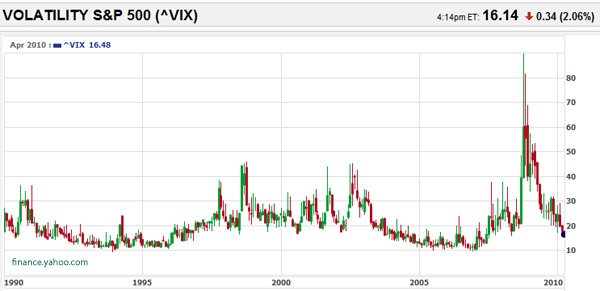
Here's an indication the economic panic is over.
The VIX volatility index is back to normal.
It measures
people's estimate of the unpredictability of the S&P 500 stock index.
(Got that? What I mean is, when people feel that
the index is more unpredictable, options in either direction become
more expensive, and that's what they measure.)
For VIX, low is good, and it seems to have settled down to pre-panic levels.
Permanent link to this entry
Short notes
Astronomers, take note of
Comet 81P/Wild,
presently
9th magnitude, in Virgo.
The discoverer's name is German and is pronounced "vilt."
History buffs, take note of Laki,
the Icelandic volcano, and its 1783 eruption.
What we don't remember about 1783 is that, as the American Revolution was ending,
Europe was having really terrible weather, complete with poisonous fumes in the air.
I wonder how much the volcano-influenced weather affected the course of events.
Permanent link to this entry


|
2010
April
9
(Extra)
|
Shredder oil is not petroleum...
Technical discovery of the day:
Paper-shredder oil is not petroleum.
It is vegetable oil, not suitable for long-term lubrication of other machinery
because it will eventually gum up. Presumably, in a shredder, the oil is
carried away by the paper being shredded, so that it needs to be replenished
often anyhow.
I suppose vegetable oil is used for biodegradability, to make it easier
to recycle the paper shreds. But I don't know. Low flammability may also
be a concern.
Incidentally, vegetable oil is often used by machinists as a tapping and cutting
lubricant; this is a handy way to get it in a bottle that dispenses one drop at a time.
Permanent link to this entry


|
2010
April
8-9
|
Transmutation complete
The new American Express cards arrived today. Apparently Bank of America
simply failed to send me a letter they were supposed to send earlier,
explaining what was going to happen.
The terms of the account remain the same, and the reward points have
increased somewhat. Hmmm...
Permanent link to this entry
Linux updates
I have several computers set up to dual-boot Windows and Linux, and Linux is used
only occasionally. I'm getting these up to date (to Ubuntu 9.10; yes, I know 10.04
is imminent). Most of them had 8.04. You have to update step by step, through 8.10
and 9.04, then 9.10. It's automatic but slow. Because 8.04 is a long-term-support
(LTS) release, you have to tell its updater to show all the versions, not just the
LTS versions.
For those who don't know: Ubuntu Linux version numbers encode the year and month.
Thus 9.10 is not the tenth sub-version of the ninth version.
It is the October 2009 version. The April 2010 version (10.04) is coming very soon.
There is a release every October and every April.
Permanent link to this entry


|
2010
April
7
|
Alchemy indeed
Bank of America Customer Service tells me that, indeed, they're switching me
from Visa to American Express and I'll be receiving a new card shortly, but
the old card will remain valid until its expiration date. Hmmm.
Why didn't they ask me before doing this?
This has no practical effect because I don't use all my credit cards anyhow.
Permanent link to this entry


|
2010
April
6
|
Financial alchemy?
My Bank of America Visa card — which I rarely use, but which I used
a few times last month to keep it alive — seems to have changed
into an American Express card. At least that's what the web site says it is.
The paper statement gives almost no indication what it is — neither
Visa nor anything else — but there is some mention of American Express
in the fine print. Naturally the piece of plastic still says Visa.
I'm puzzled. Transmutation of elements?
Alchemy, or radioactive decay?
Permanent link to this entry


|
2010
April
5
|
A bit of planetary photography
Here are a few recent images of Mars and Saturn.
Mars is now three times as far away as at its famous close pass in 2003,
so we don't see as much detail on it as we did then.
I'm still using a modified webcam to record video with my 8-inch telescope,
then separating and stacking the video frames.
But the quality of the pictures will improve soon,
since I've just ordered an ImagingSource
astronomical video camera.

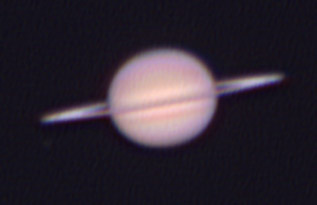
Mars.jpg)
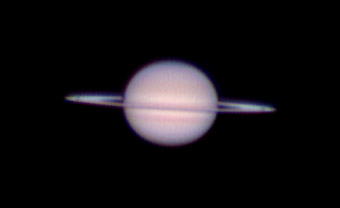
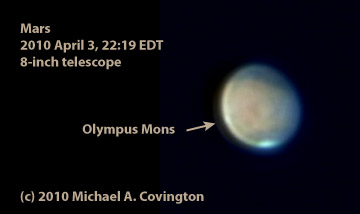
Permanent link to this entry


|
2010
April
4
|
Feast Day of the Resurrection of Our Lord
"Quickly, now, go tell His disciples that Jesus Christ is no longer dead..."
Permanent link to this entry


|
2010
April
2-3
|
Good Friday and how I got into astronomy
Today (April 2) is Good Friday, 2010, and it reminds me of
Good Friday, April 12, 1968, which happened to be the day my
sixth grade class went to see the planetarium at Valdosta State College.
That marked a milestone in my early days as an amateur astronomer.
I had gotten interested in astronomy in October 1967 but couldn't
learn to recognize any constellations.
Then, in March 1968, I noticed three stars in a row, appearing
out of the evening twilight in the same place every evening,
and they turned out to be the belt of Orion.
I was sad when Orion disappeared into the evening twilight the
following month — as I am every April — and happy
when it came back around in December.
With a firm grip on Orion, of course I quickly learned several surrounding
constellations. My sixth grade teacher (Jean W. Williams) lent me a copy
of Baker's Astronomy, and by mid-April I was quite an astronomy
enthusiast.
So on Good Friday we went to the planetarium in Nevins Hall, which
was then only half of its present quadrangular structure; it had only
the front (east) and south sides. The north and west sides were added
around 1972.
I remember that it was Good Friday because we saw a student from St. John's
walking down the street, not in school, and someone remarked that they had Good Friday off.
The following day we went to my grandmother's house in Jenkins County, and
there was a lunar eclipse — a beautiful bright red one, as I recall.
And the day after that was Easter.
Permanent link to this entry


|
2010
April
1
|
Today's April foolery
Actual conversation between our office manager and a vendor, condensed:
"Why did you lose the order we sent you in March?"
"We lost all our files in a disk crash in February."
(So you lost it a month before we sent it to you?)
Tomorrow, April 2, is the 28th anniversary of my last day in graduate school.
I didn't want to finish my Ph.D. on April 1.
Permanent link to this entry


|
|
|
This is a private web page,
not hosted or sponsored by the University of Georgia.
Copyright 2009 Michael A. Covington.
Caching by search engines is permitted.
To go to the latest entry every day, bookmark
http://www.covingtoninnovations.com/michael/blog/Default.asp
and if you get the previous month, tell your browser to refresh.
Entries are most often uploaded around 0000 UT on the date given, which is the previous
evening in the United States. When I'm busy, entries are generally shorter and are
uploaded as much as a whole day in advance.
Minor corrections are often uploaded the following day. If you see a minor error,
please look again a day later to see if it has been corrected.
In compliance with U.S. FTC guidelines,
I am glad to point out that unless explicitly
indicated, I do not receive payments, free merchandise, or other remuneration
for reviewing or mentioning products on this web site.
I have a Canon EOS 20Da camera and a Tektronix
TDS 210A oscilloscope on long-term loan from their manufacturers. Other reviewed
products are usually things I purchased for my own use, or occasionally items
lent to me briefly by manufacturers and described as such.
|
|






















Mars.jpg)

